
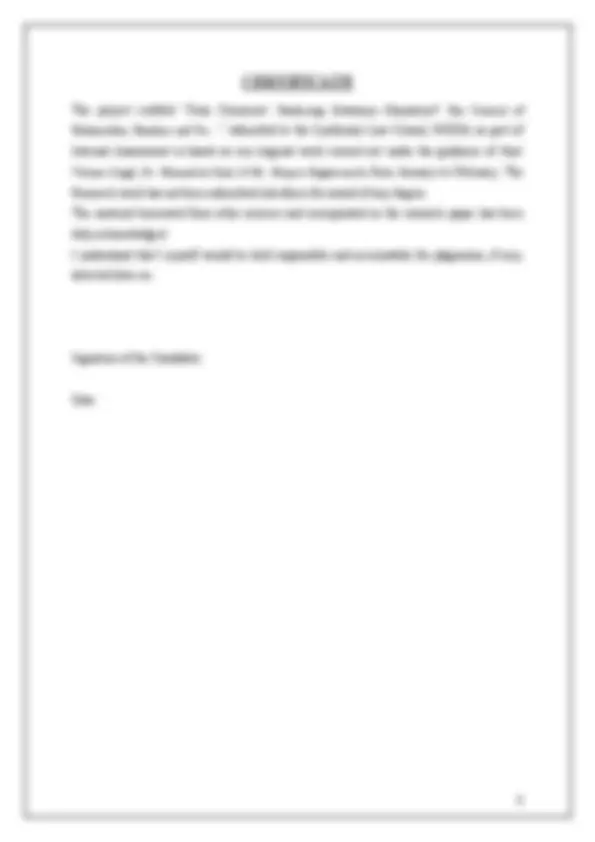
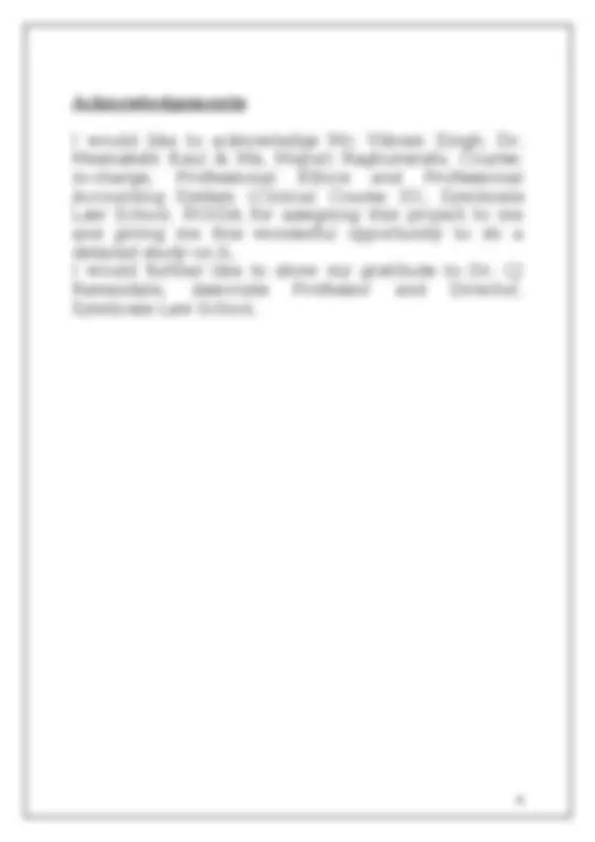
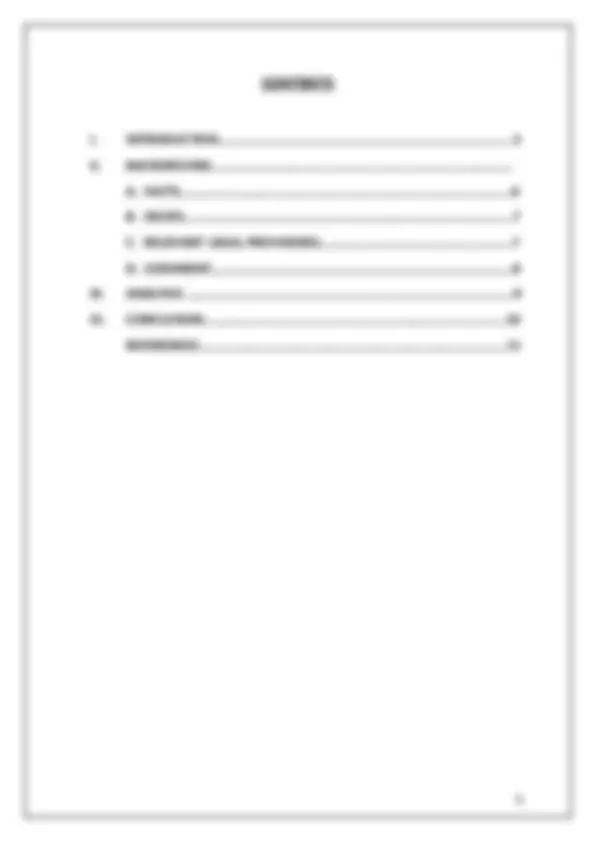
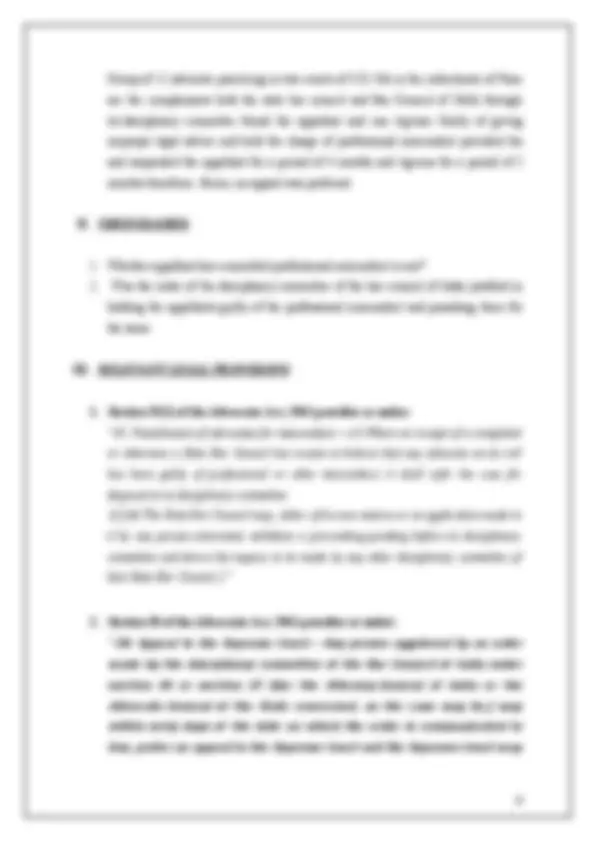
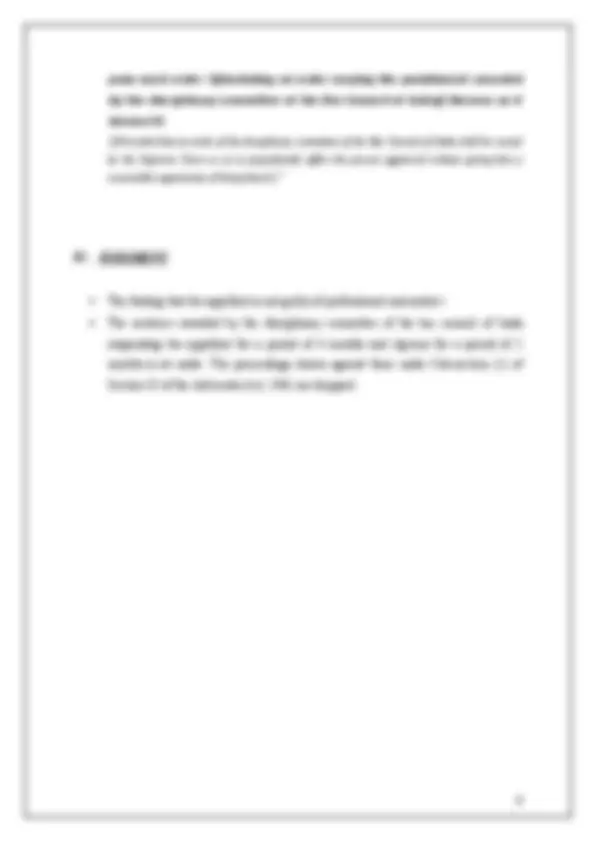
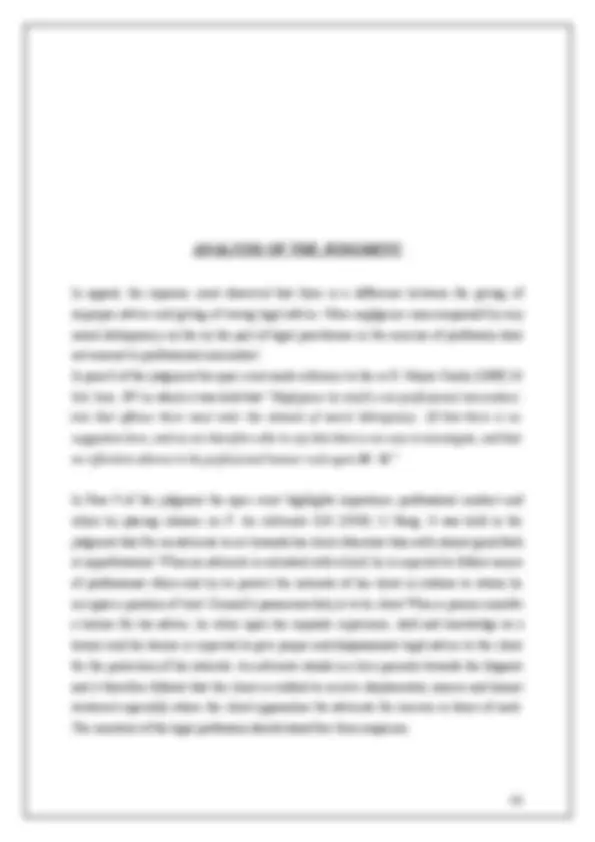
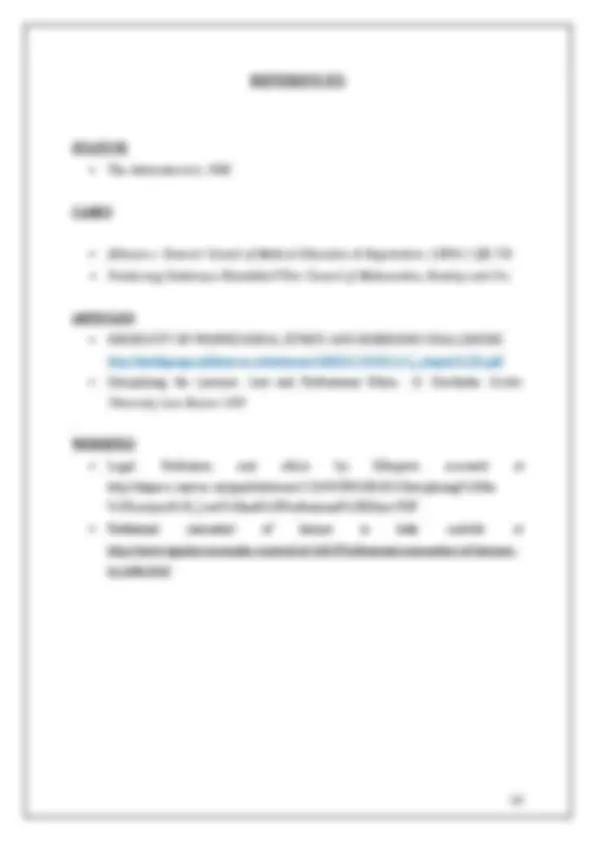


Study with the several resources on Docsity

Earn points by helping other students or get them with a premium plan


Prepare for your exams
Study with the several resources on Docsity

Earn points to download
Earn points by helping other students or get them with a premium plan
Community
Ask the community for help and clear up your study doubts
Discover the best universities in your country according to Docsity users
Free resources
Download our free guides on studying techniques, anxiety management strategies, and thesis advice from Docsity tutors
• Nothing a member of the legal community does should have the potential to undermine the public's faith in the fidelity, honesty, and integrity of the legal profession. It is unprofessional for an advocate to treat his client in any way other than with the utmost good faith. It is improper for a lawyer to suggest that an advocate accept work with such a motive or for as long as his client is aware of his motivations. A member of the bar who prepares fake documents or drafts pleadings with knowledge that the claims presented are false is acting improperly in the eyes of the profession
Typology: Schemes and Mind Maps
1 / 13

This page cannot be seen from the preview
Don't miss anything!








Acknowledgements
I would like to acknowledge Mr. Vikram Singh, Dr. Meenakshi Kaul & Ms. Mayuri Raghuvanshi, Course- in-charge, Professional Ethics and Professional Accounting System (Clinical Course III), Symbiosis Law School, NOIDA for assigning this project to me and giving me this wonderful opportunity to do a detailed study on it. I would further like to show my gratitude to Dr. CJ Rawandale, Associate Professor and Director, Symbiosis Law School.
PANDURANG DATTATRAYA KHANDEKAR V. BAR COUNCIL OF INDIA AND ORS
The complainants alleged various acts of professional misconduct against the appellant and Agavane. According to them, the appellant and agavane sometimes impersonated as other advocates for whom the briefs were meant and at times they directly approached the clients and adopted questionable methods charging exorbitant fees.
On January 7, 1974 the appellant and Agavane are alleged to have got the remarriage of a couple S.B. Potdar and Smt. Leelawati Dhavale performed although their divorce was not legal. The accusation is that the appellant and Agavane induced Potdar and Smt. Dhavale to part with Rs. 100 towards their professional fee on the faith of an assurance that the affidavit sworn by them before the Sub-Divisional Magistrate, Poona to the effect that they had divorced their respective spouses and had got married at Poona on January 7, 1974 as per Hindu rites would be sufficient proof of their marriage.
On February 22, 1974 the appellant and Agavane drew up an affidavit containing a recital that Smt. Sonubai Girju Valekar of Loni Bhapkar, Tehsil Baramati, District Poona had made a gift of her lands to her grand-daughter Smt. Mangala Ramesh Ghorpade. The charge is that she had met all the lawyers except these two and all of them advised her to give the market value of the land intended to be gifted and pay ad valorem stamp duty thereon indicating the amount of stamp duty and the registration charges payable, but these two lawyers told her that she should not unnecessarily spend a large amount over the stamp duty and registration charges and they would instead have the work done within an amount of Rs. 50 which was finally settled at Rs. 45.
Group of 12 advocate practicing in two courts of S.D. Ms in the collectorate of Pune are the complainants both the state bar council and Bar Council of Delhi through its disciplinary committee found the appellant and one Agvane Guilty of giving improper legal advice and held the charge of professional misconduct provided the and suspended the appellant for a period of 4 months and Agvane for a period of 2 months therefrom. Hence, an appeal was preferred.
II. ISSUES RAISED
III. RELEVANT LEGAL PROVISIONS
1. Section 35(1) of the Advocates Act, 1961 provides as under: “35. Punishment of advocates for misconduct. —(1) Where on receipt of a complaint or otherwise a State Bar Council has reason to believe that any advocate on its roll has been guilty of professional or other misconduct, it shall refer the case for disposal to its disciplinary committee. 1[(1A) The State Bar Council may, either of its own motion or on application made to it by any person interested, withdraw a proceeding pending before its disciplinary committee and direct the inquiry to be made by any other disciplinary committee of that State Bar Council.] “ 2. Section 38 of the Advocates Act, 1961 provides as under: “ 38. Appeal to the Supreme Court.—Any person aggrieved by an order made by the disciplinary committee of the Bar Council of India under section 36 or section 37 2[or the Attorney-General of India or the Advocate-General of the State concerned, as the case may be,] may within sixty days of the date on which the order is communicated to him, prefer an appeal to the Supreme Court and the Supreme Court may
In appeal, the supreme court observed that there is a difference between the giving of improper advice and giving of wrong legal advice. Mere negligence unaccompanied by any moral delinquency on the on the part of legal practitioner in the exercise of profession does not amount to professional misconduct. In para 8 of the judgment the apex court made reference to the re G. Mayor Cooke [1889] 33 Sol. Jour. 397 in which it was held that “ Negligence by itself is not professional misconduct; into that offence there must enter the element of moral delinquency. Of that there is no suggestion here, and we are therefore able to say that there is no case to investigate, and that no reflection adverse to his professional honour rests upon Mr. M.”
In Para 9 of the judgment the apex court highlights importance professional conduct and ethics by placing reliance on P. An Advocate ILR [1933] 12 Rang. It was held in the judgment that For an advocate to act towards his client otherwise than with utmost good faith is unprofessional. When an advocate is entrusted with a brief, he is expected to follow norms of professional ethics and try to protect the interests of his client in relation to whom he occupies a position of trust. Counsel's paramount duty is to he client When a person consults a lawyer for his advice, he relies upon his requisite experience, skill and knowledge as a lawyer and the lawyer is expected to give proper and dispassionate legal advice to the client for the protection of his interests. An advocate stands in a loco parentis towards the litigants and it therefore follows that the client is entitled to receive disinterested, sincere and honest treatment especially where the client approaches the advocate for succour in times of need. The members of the legal profession should stand free from suspicion.
In Para 11 of the judgement the apex court had reached a conclusion by analysing all the facts and held that hat there was abundant evidence upon which the Disciplinary Committee could find the appellant and Agavane guilty of giving wrong legal advice, but there is considerable doubt whether upon such evidence the charge of professional misconduct can be supported. Furthermore the suprement court said that, it is not at all certain that it can be said with strict accuracy that the appellant was guilty of moral turpitude or that there was any moral delinquency on his part. The Judgment is correct and clears the law. In arriving at the conclusion, the reasoning given by the court is fairly consistent with the existing law.
The role of the lawyers in the society is of great importance. They being part of the system of delivering justice holds great reverence and respect in the society. Each individual has a well -defined code of conduct which needs to be followed by the person living in the society. A lawyer in discharging his professional assignment has a duty to his client, a duty to his opponent, a duty to the court, a duty to the society at large and a duty to himself. It needs a high degree of probity and poise to strike a balance and arrive at the place of righteous stand, more so, when there are conflicting claims. While discharging duty to the court, a lawyer should never knowingly be a party to any deception, design or fraud. While placing the law before the court a lawyer is at liberty to put forth a proposition and canvass the same to the best of his wits and ability so as to persuade an exposition which would serve the interest of his client and the society. The advocate, as an officer of the Court, also has the responsibility to render services of sound quality. Lapses in services in the nature of absence when the matters are called out, the filing of incomplete and inaccurate pleadings – many times even illegible and without personal check and verification, the non-payment of court fees and process fees, the failure to remove office objections, the failure to take steps to serve the parties are not merely professional omission. They amount to positive dis-service to the litigants and create embarrassing situation in the court leading to avoidable unpleasantness and delay in the disposal of matters, and detrimentally affects the entire judicial system. Furthermore, as the officers of the court the lawyers are required to uphold the dignity of the judicial office and maintain a respectful attitude towards the Court. This is because the Bar and the Bench form a noble and dynamic partnership geared to the great social goal of administration of justice, and the mutual respect of the Bar and the Bench is essential for
The Advocates Act, 1960
CASES
Allinson v. General Council of Medical Education & Registration (1894) 1 QB 750 Pandurang Dattatraya KhandekarV Bar Council of Maharashtra, Bombay and Ors.
ARTICLES NECESSITY OF PROFESSIONAL ETHICS AND EMERGING CHALLENGES http://shodhganga.inflibnet.ac.in/bitstream/10603/127670/15/12_chapter%203.pdf Disciplining the Lawyers: Law and Professional Ethics G. Geethisha Cochin University Law Review 2003 . WEBSITES Legal Profession and ethics by Elbepeter accessed at http://dspace.cusat.ac.in/jspui/bitstream/123456789/10810/1/Disciplining%20the %20Lawyers%20_Law%20and%20Professional%20Ethics.PDF Professional misconduct of lawyers in India available at http://www.legalservicesindia.com/article/1665/Professional-misconduct-of-lawyers- in-india.html